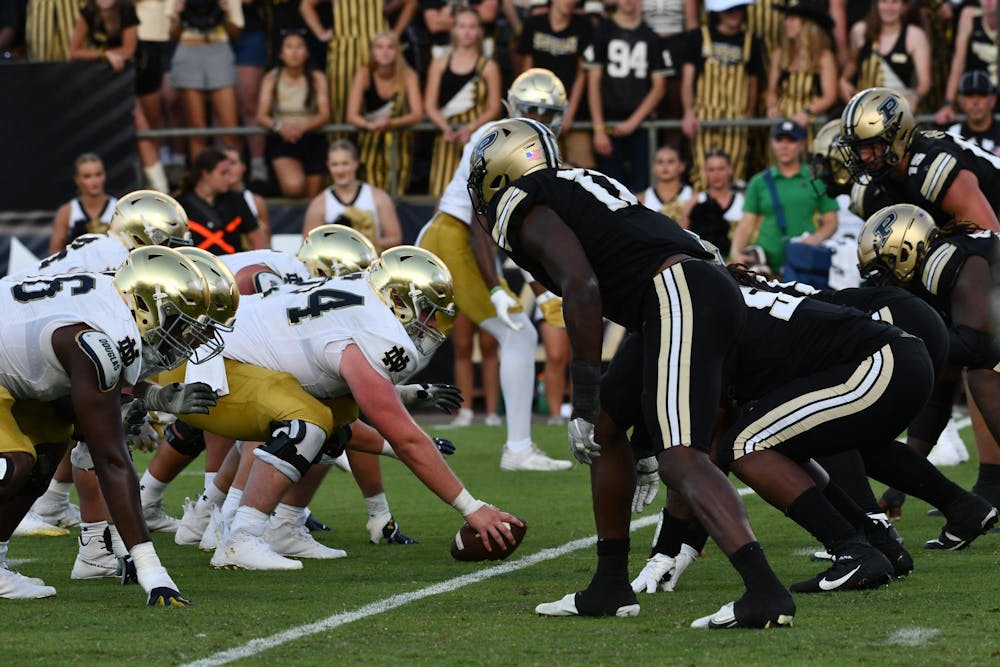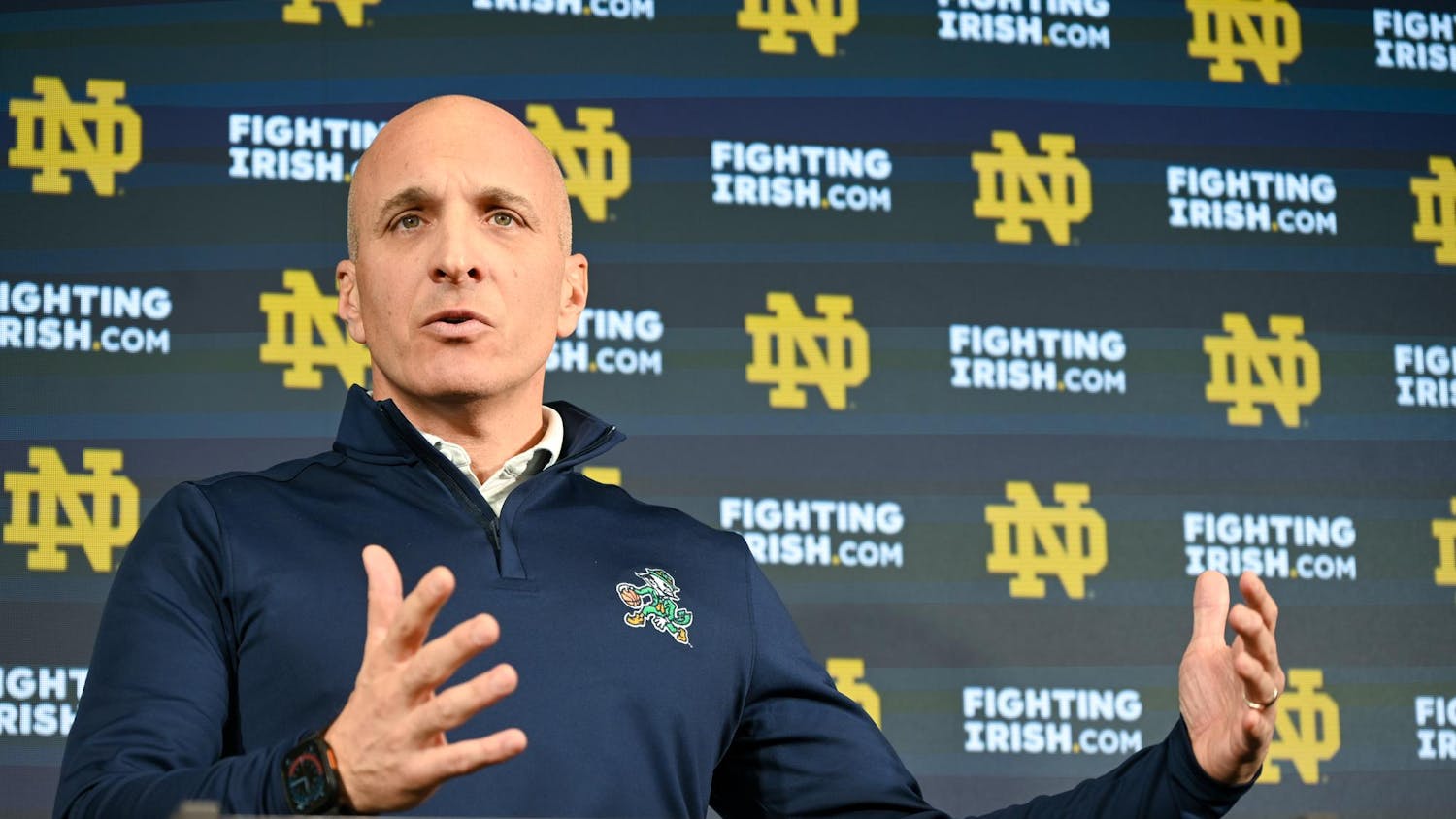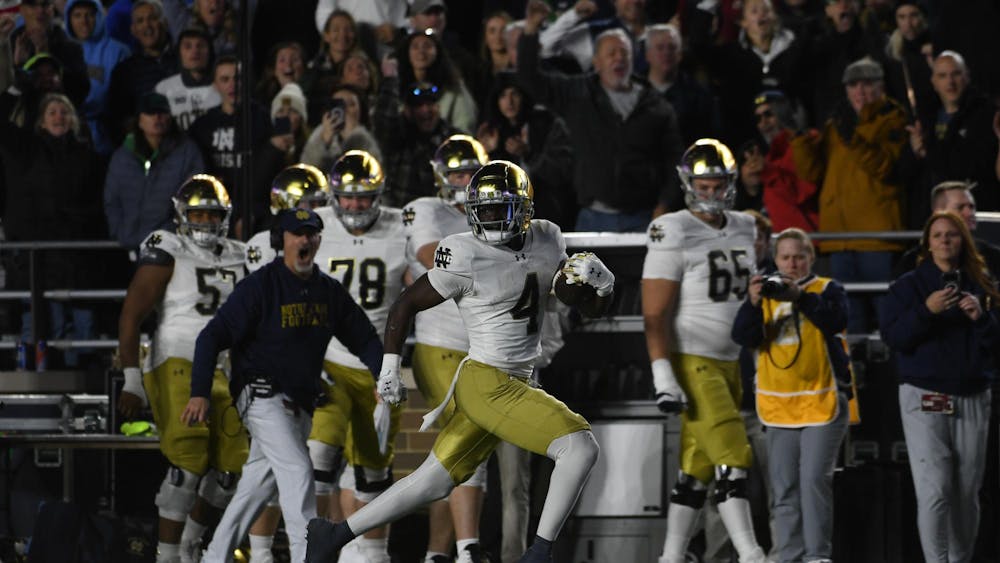Three weeks ago, Notre Dame was on the losing end of the biggest upset in all of college football to date when it suffered a 16-14 defeat at home against Northern Illinois. On that Saturday night in South Bend, it was hard to imagine that the Irish would be where they are today — 4-1, ranked No. 14 nationally and holding claim to a pair of top-25 wins that give them one of the more impressive resumes in the country. On Saturday, they took down undefeated No. 15 Louisville while showcasing a complete — albeit mistake-filled — performance on both sides of the ball.
Despite the three straight wins, the elite defensive play and the consistently improving efforts offensively, it’s easy to get the sense that the perception of this Irish team among media and fans alike hasn’t changed much since that loss to the Huskies. Those that counted Notre Dame out and dismissed them from national relevancy after a single loss haven’t changed their tune that the Irish are overrated, are being propped up by a weak schedule and aren’t true College Football Playoff (CFP) contenders.
Part of that impression is no doubt Notre Dame’s own doing. Notre Dame did indeed lose at home to Northern Illinois and was held scoreless for nearly the entire first half of its eventual win against Miami (Ohio). The inconsistency in the Irish passing game is a legitimate cause for concern, and their frequent mental miscues in the form of costly penalties and key turnovers have been very real.
But another part seems to come from the fact that, at least on the surface, this Notre Dame team isn’t one that wins with flash. The Irish are widely viewed — and have been for the last several years — as a team that wins on the basis of strong defensive play that’s supported by a rugged, run-first offense that is not enough to truly compete with the nation’s best in comparison to the gaudy passing numbers being put up by teams like Miami (Florida), Oregon and Tennessee this season.
Even after Notre Dame’s 66-7 decimation of Purdue — a game in which the Irish led 42-0 at halftime against a Big Ten opponent on the road and looked virtually unstoppable on offense — a primary postgame talking point was that Irish senior quarterback Riley Leonard still had yet to throw a passing touchdown three games into the season, never mind the three he scored on the ground in the first half alone.
And as the Irish move into the next stage of their season following their upcoming bye week, that narrative is not one that’s likely to change. Many of the doubts about Notre Dame’s ability to reenter the CFP race stem from a schedule that is not considered to be particularly challenging, especially in comparison to those of teams in the new SEC and Big Ten “super-conferences.” But Notre Dame’s upcoming slate includes a trio of games against ACC opponents playing at a very high level this season in Stanford, Georgia Tech and Virginia, neutral-site matchups against Navy and Army — a pair of undefeated squads that are both still in playoff contention — and a primetime duel with a struggling Florida State team that was expected to be a top-10 team entering the year and still fields an extremely talented roster that could hit its stride at any moment. And that’s not to mention the regular season finale against No. 11 USC on the road.
These would all be tough games for any team, games in which coming away with a win by any margin is a clear success and games in which the Irish aren’t likely to hang 40 points on the scoreboard or win by three possessions. But because they come against unranked opponents, the expectation will likely be for Notre Dame to dominate, and any failure to do so will be just one more reason why they wouldn’t be competitive with the nation’s top teams.
The good news for the Irish, though, is that none of that really matters so long as they keep winning. Over the past three weeks, that’s exactly what they’ve done, and they’ve started to develop their identity along the way.
After the win against Louisville, Notre Dame head coach Marcus Freeman made reference to resilience and toughness several times during his postgame remarks. Those characteristics have shown through for the Irish in a number of ways, ranging from getting up off the mat after the devastating loss against Northern Illinois to quickly recapturing control of the game against the Cardinals after losing a fumble on the opening kickoff to withstanding the absence of several key defensive players on Saturday and still delivering winning plays down the stretch.
That mindset, instilled by Freeman and the Notre Dame coaching staff, has reverberated throughout the entire Irish program. On Saturday night, a banged-up Leonard said with a laugh that it was “kind of soft” for him to have to be subbed out for even just a single play after having the wind knocked out of him against the Cardinals. Freeman disagreed with that characterization, referring to Leonard as a “tough, tough guy” and calling his desire to return to action so quickly and get involved in the run game indicative of “the competitor he is.” He spoke in similar terms about his team’s ability to overcome any adversity and “get the job done” against a top opponent.
It is true that Notre Dame’s primary strengths lie with its defense and rushing attack, but those would likely be the strengths of any team with the talent and depth that the Irish feature on the defensive side and in the backfield. Maybe they won’t suddenly start lighting opponents up for 300 passing yards per game, although Leonard and Co. have made significant strides in that area every week, with sophomore wide receiver Jaden Greathouse and sophomore running back Jeremiyah Love each recording long touchdown receptions against Louisville and graduate wideout Jayden Harrison adding a 34-yard pickup on a downfield shot.
Either way, if the Irish continue to play with grit and toughness and find ways to finish games with more points than their opponents, they’ll go home happy and keep rising in the national polls. As the teams perched above them drop more and more games, this three-game winning streak has repositioned Notre Dame firmly in the playoff race, despite how unlikely that may have seemed after the Northern Illinois defeat.
As the autumn weeks pass by, the Irish will continue to be doubted and discounted, particularly on the offensive side of the ball. And if they do play well enough down the stretch to find themselves in the playoff, they’ll almost assuredly be considered underdogs against teams that are perceived as being more explosive or dynamic.
But gaining those style points and altering its national perception isn’t on Notre Dame’s radar. The Irish have turned the page from their early defeat not by dramatically shifting their mentality or game plan, but simply by playing tough and winning games. And for the Irish to get to where they want to go this season and reach their lofty goals, continuing to stack one win on top of another — whether in a 66-point offensive rampage like they had against Purdue or a grind-it-out, low-scoring dogfight like they one they opened their season with against Texas A&M — is all that counts.
The Irish don’t need to win in a certain style, they just need to win. And if they can do that just like they have on each of the past three Saturdays, they might wind up surprising some of the people who counted them out after that fateful home opener loss.









